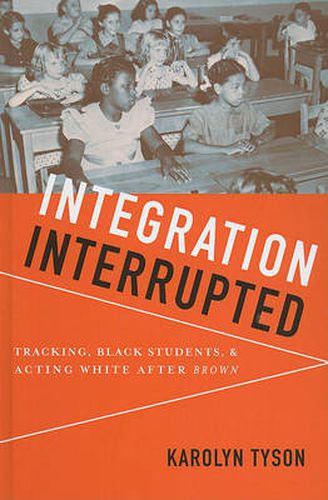Readings Newsletter
Become a Readings Member to make your shopping experience even easier.
Sign in or sign up for free!
You’re not far away from qualifying for FREE standard shipping within Australia
You’ve qualified for FREE standard shipping within Australia
The cart is loading…






An all-too-popular explanation for why black students aren’t doing better in school is their own use of the acting white slur to ridicule fellow blacks for taking advanced classes, doing schoolwork, and striving to earn high grades. Carefully reconsidering how and why black students have come to equate school success with whiteness, Integration Interrupted argues that when students understand race to be connected with achievement, it is a powerful lesson conveyed by schools, not their peers. Drawing on over ten years of ethnographic research, Karolyn Tyson shows how equating school success with acting white arose in the aftermath of Brown v. Board of Education through the practice of curriculum tracking, which separates students for instruction, ostensibly by ability and prior achievement. Only in very specific circumstances, when black students are drastically underrepresented in advanced and gifted classes, do anxieties about the burden of acting white emerge. Racialized tracking continues to define the typical American secondary school, but it goes unremarked, except by the young people who experience its costs and consequences daily. The rich narratives in Integration Interrupted throw light on the complex relationships underlying school behaviors and convincingly demonstrate that the problem lies not with students, but instead with how we organize our schools.
$9.00 standard shipping within Australia
FREE standard shipping within Australia for orders over $100.00
Express & International shipping calculated at checkout
Stock availability can be subject to change without notice. We recommend calling the shop or contacting our online team to check availability of low stock items. Please see our Shopping Online page for more details.
An all-too-popular explanation for why black students aren’t doing better in school is their own use of the acting white slur to ridicule fellow blacks for taking advanced classes, doing schoolwork, and striving to earn high grades. Carefully reconsidering how and why black students have come to equate school success with whiteness, Integration Interrupted argues that when students understand race to be connected with achievement, it is a powerful lesson conveyed by schools, not their peers. Drawing on over ten years of ethnographic research, Karolyn Tyson shows how equating school success with acting white arose in the aftermath of Brown v. Board of Education through the practice of curriculum tracking, which separates students for instruction, ostensibly by ability and prior achievement. Only in very specific circumstances, when black students are drastically underrepresented in advanced and gifted classes, do anxieties about the burden of acting white emerge. Racialized tracking continues to define the typical American secondary school, but it goes unremarked, except by the young people who experience its costs and consequences daily. The rich narratives in Integration Interrupted throw light on the complex relationships underlying school behaviors and convincingly demonstrate that the problem lies not with students, but instead with how we organize our schools.